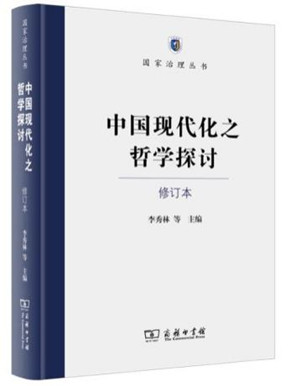
. > WHAT'S NEW > BOOKS
Chinese nation going through modern transformations
Author : LIU ZHIHONG Source : Chinese Social Sciences Today 2023-06-29

A Philosophical Discussion of Chinese Modernization
A Philosophical Discussion of Chinese Modernization, first published in 1990, under the chief editorship of Li Xiulin (1931–86), former vice dean of the Graduate School at Renmin University of China, et al., put forward the concept of “socialist modernization with Chinese characteristics” some 30-odd years ago. It astutely posits that Chinese modernization possesses distinct Chinese attributes. It further argues that the progress of socialist modernization, characterized by its Chinese traits and national style, represents a distinctive and noteworthy contribution by the Chinese nation to world history.
The book theoretically examines the goal, content, approach, and main body of China’s modernization drive, striving to present an overall landscape. This is praiseworthy at the dawn of China’s modernization development, demonstrating the forward-looking and visionary nature of philosophical thought.
Although the theory of modernization and modernity has been long discussed, many still fail to accurately grasp the core connotations of these two concepts. “Modern” refers to the historical endeavors of contemporary individuals and the history of their activities. “Modernity” is revealed through the epochal nature or inherent characteristics of human society in the modern era. This stipulation arises and permeates through the daily activities of contemporary individuals, encompassing all aspects and dimensions of modern society. It represents the amalgamation of diverse characteristics that distinguish it from traditional society and individuals, spanning economic, political, cultural, social (in a narrow sense), and ecological domains.
In the most general sense, modernization means the transformation and changes of society or socialized humans in modern times. If modernity is a static description of modern society or human attributes, then modernization refers to the dynamic emergence and development of the modern characteristics of society or human beings. In other words, modernization is the generative process of modernity, while modernity is the result of the former.
Modernization “essentially indicates a degree of development in which human, as a subject, understands, grasps, and occupies the object world, and concerns the highest level of development in the present era.” Consequently, it is insufficient to view a particular model of development as the epitome of advancement. Instead, we must deliberately consider the most promising prospects in contemporary society and acknowledge the variations between different models.
The book makes an incisive distinction between the complex relationship between modernization and Westernization. “A country or nation should not lose its creative power as the subject of modernization under the erroneous idea of ‘modernization equals Westernization,’ nor should it view Westernization as a horrible trap so that it loses its subjectivity and halts on the road of modernization.” The understanding of modern, modernization, and modernity still has theoretical and practical implications to this day.
Liu Zhihong is an associate professor from the School of Philosophy at Renmin University of China.
Ye Shengtao made Chinese fairy tales from a wilderness
Ye Shengtao (1894–1988) created the first collection of fairy tales in the history of Chinese children’s literature...
-
How northern ethnicities integrated into Chinese nation
2023-09-18
-
Mogao caves
2023-09-12
-
Mogao Grottoes as ‘a place of pilgrimage’
2023-09-12
-
Time-honored architectural traditions in China
2023-08-29
-
Disentangling the civilizational evolution of China
2023-08-28
-
AI ethics in science fiction
2023-08-23













 2011-2013 by www.cssn.cn. All Rights Reserved
2011-2013 by www.cssn.cn. All Rights Reserved